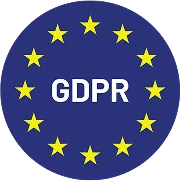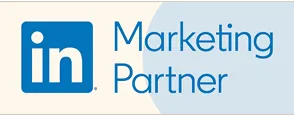ZoomInfo Alternatives: Top 5 ZoomInfo Competitors
Find the best ZoomInfo alternatives for 2025. Compare features, pricing, and benefits to find the right sales intelligence tool for your team today.
ZoomInfo has cemented itself as one of the most well-known names in the sales tools & intelligence space. Recognized by G2 and Forrester as a category leader, it’s often the first stop for revenue teams exploring their stack, especially when comparing it to Apollo.
With its massive B2B database, real-time buyer intent data, AI-powered account intelligence, and seamless CRM integrations, ZoomInfo positions itself as more than just another data provider. It’s marketed as a full-stack growth engine for modern GTM teams.
TL;DR
- ZoomInfo is a leading sales intelligence platform with a massive B2B database and AI-driven insights.
- Businesses often look for a ZoomInfo alternative due to high costs, complex onboarding, or limited fit for smaller teams.
- Popular alternatives include Factors.AI, Apollo.io, UpLead, Lusha, Seamless.AI, and Hunter.io.
- Each platform offers unique strengths like verified data accuracy, affordability, or simplified workflows.
- Choosing the right tool depends on priorities such as budget, integrations, and data reliability.
- ZoomInfo works well for display advertising capabilities, company and contact database. However, Factors.ai, on the other hand, is purpose-built for LinkedIn and Google Ads, helping marketers optimize campaigns, improve ROI, and connect ad performance directly to pipeline.
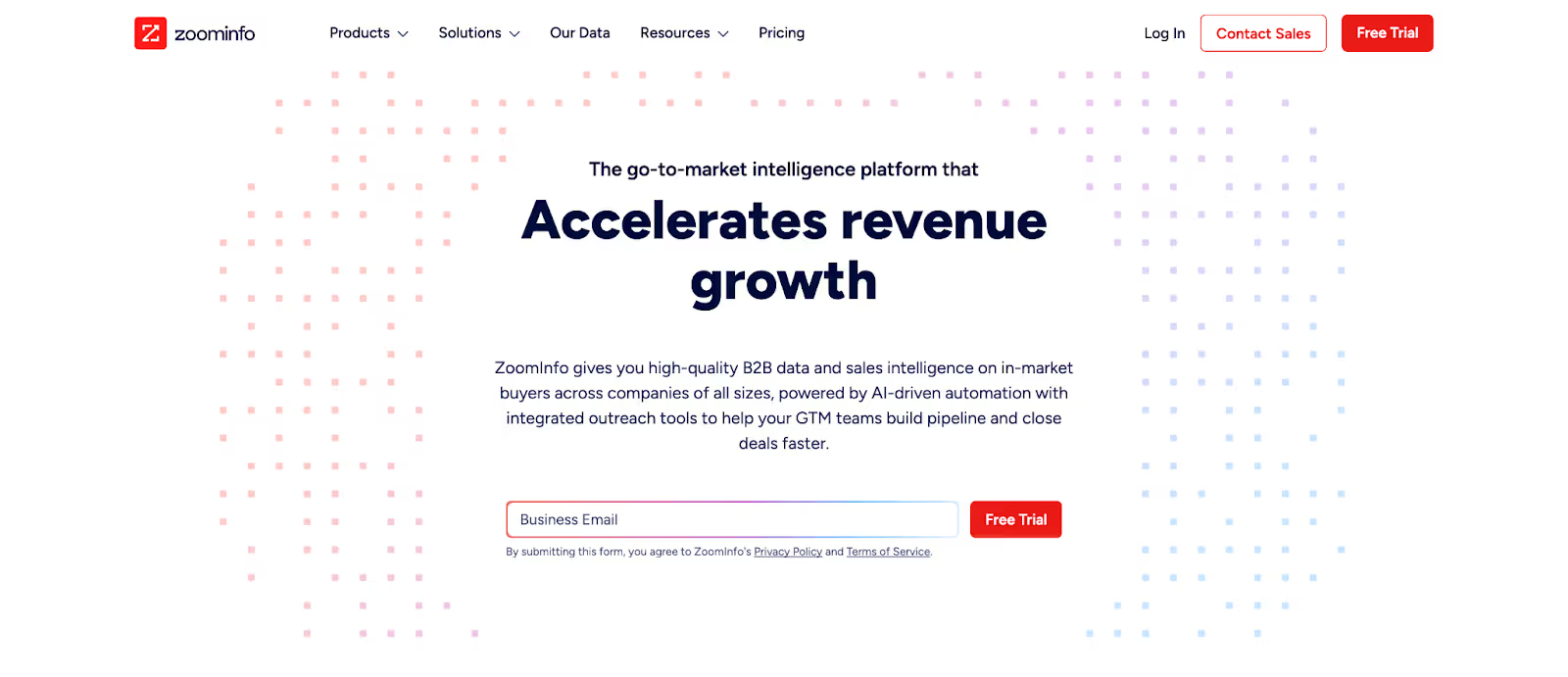
ZoomInfo’s Core Offerings
ZoomInfo positions itself as an all-in-one sales tools & intelligence platform, giving GTM teams the data and automation they need to identify, engage, and convert high-value accounts. Here’s what it brings to the table:
- Extensive B2B Database: Verified, accurate, and compliant company and contact information to expand your total addressable market (TAM) and connect with the right decision-makers.
- Buyer Intent Signals: Uses third-party intent data to yield insights into which accounts are actively researching solutions, so sales teams can prioritize outreach more effectively.
- AI-Powered Account Intelligence: Deeper visibility into target accounts with details like organizational changes, new stakeholders, and emerging pain points.
- Data Enrichment & Automation: Keep CRM records updated with fresh data, while automating workflows like lead routing, territory management, and follow-ups.
- Seamless Integrations: Out-of-the-box connections with leading platforms such as Salesforce, HubSpot, Outreach, and Marketo to align sales and marketing teams.
Trusted by 35,000+ businesses, ZoomInfo is often the first stop for teams comparing Apollo vs ZoomInfo or evaluating other ZoomInfo competitors. But despite its strong reputation, not every business finds it to be the perfect fit, which is why many start looking for a ZoomInfo alternative.
Why do people look for ZoomInfo Alternatives?
Let’s look at a few G2 reviews that highlight why some teams begin exploring ZoomInfo alternatives:

- Data inaccuracies: Some users warn that ZoomInfo’s buyer intent signals can produce false positives, flagging companies not actually in-market. They also note that both contact details and firmographic data (such as funding and growth indicators) may be outdated or inaccurate.

- Expensive: Organizations often find ZoomInfo expensive and its pricing structure opaque and users must contact sales to get a quote, making cost comparisons difficult.

While these reviews don’t negate ZoomInfo’s strengths but do show why many teams start searching for ZoomInfo competitors that align better with their size, budget, and support expectations.
ZoomInfo Pricing
ZoomInfo does not provide pricing publicly. Its plans are organized into Sales, Marketing, and Talent Solutions, and companies need to contact ZoomInfo for a personalized quote tailored to their requirements.
For a deeper breakdown of costs, add-ons, and user feedback on affordability, you can explore our detailed guide on ZoomInfo pricing.
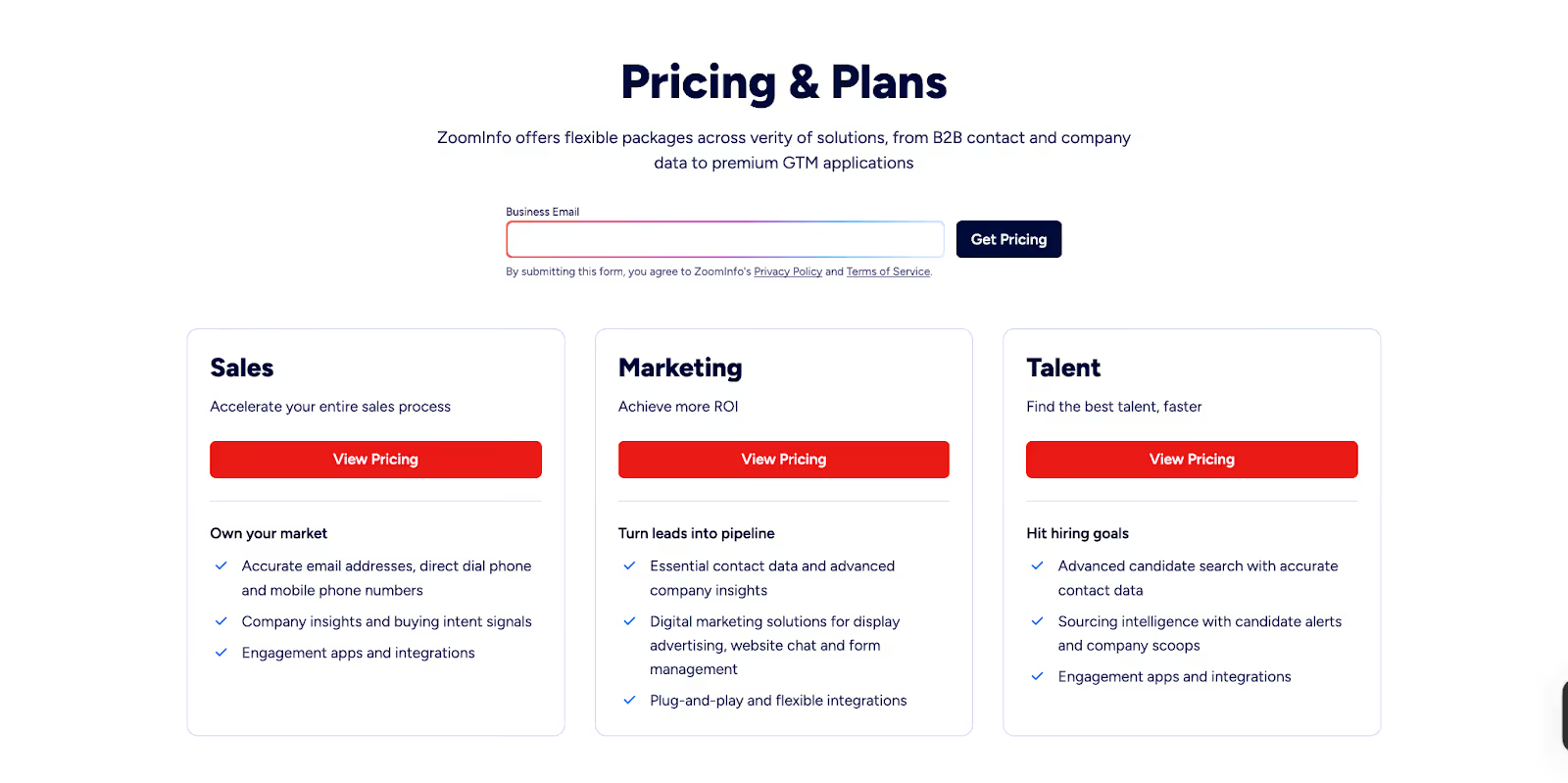
What to look for in a ZoomInfo Alternative
When evaluating a ZoomInfo alternative, it’s important to step back and define what really matters for your sales intelligence stack. While ZoomInfo is known for its massive database and advanced features, not every team needs the same depth or the same price tag. Based on user feedback and industry comparisons, here are the key factors to consider:
- Data Accuracy & Coverage: ZoomInfo is praised for its breadth, but competitors often match or exceed its accuracy guarantees. Look for alternatives that keep data fresh, verified, and compliant across your target regions.
- Ease of Use & Onboarding: Some businesses find ZoomInfo’s setup and interface complex. If your team values simplicity, prioritize tools with faster onboarding and user-friendly dashboards.
- Pricing & Flexibility: One of the top reasons teams move away from ZoomInfo is cost. Check whether alternatives provide transparent pricing, flexible contracts, or credits that scale with your business size.
- Integrations & Workflow Fit: ZoomInfo integrates deeply with CRMs, but not every team uses advanced features. Evaluate whether alternatives offer the integrations you actually need without forcing you into unnecessary add-ons.
- Support & Transparency: User reviews often mention challenges with ZoomInfo’s support and billing. Consider how responsive and reliable an alternative’s support team is, and whether their sales process feels transparent.
The right ZoomInfo alternative should balance accuracy, affordability, and usability while fitting neatly into your team’s existing workflows.
Now that we’ve broken down almost everything about ZoomInfo, let’s take a closer look at the top platforms that often come up as ZoomInfo competitors and why they’re worth considering as an alternative.
Apollo.io
When people compare Apollo vs ZoomInfo, the difference often comes down to cost, usability, and stack consolidation. Apollo positions itself as an end-to-end AI-powered sales platform with a vast B2B database, built-in engagement tools, and automation features. Trusted by 500,000+ businesses, it’s seen as a leaner, cost-effective alternative to larger players like ZoomInfo.
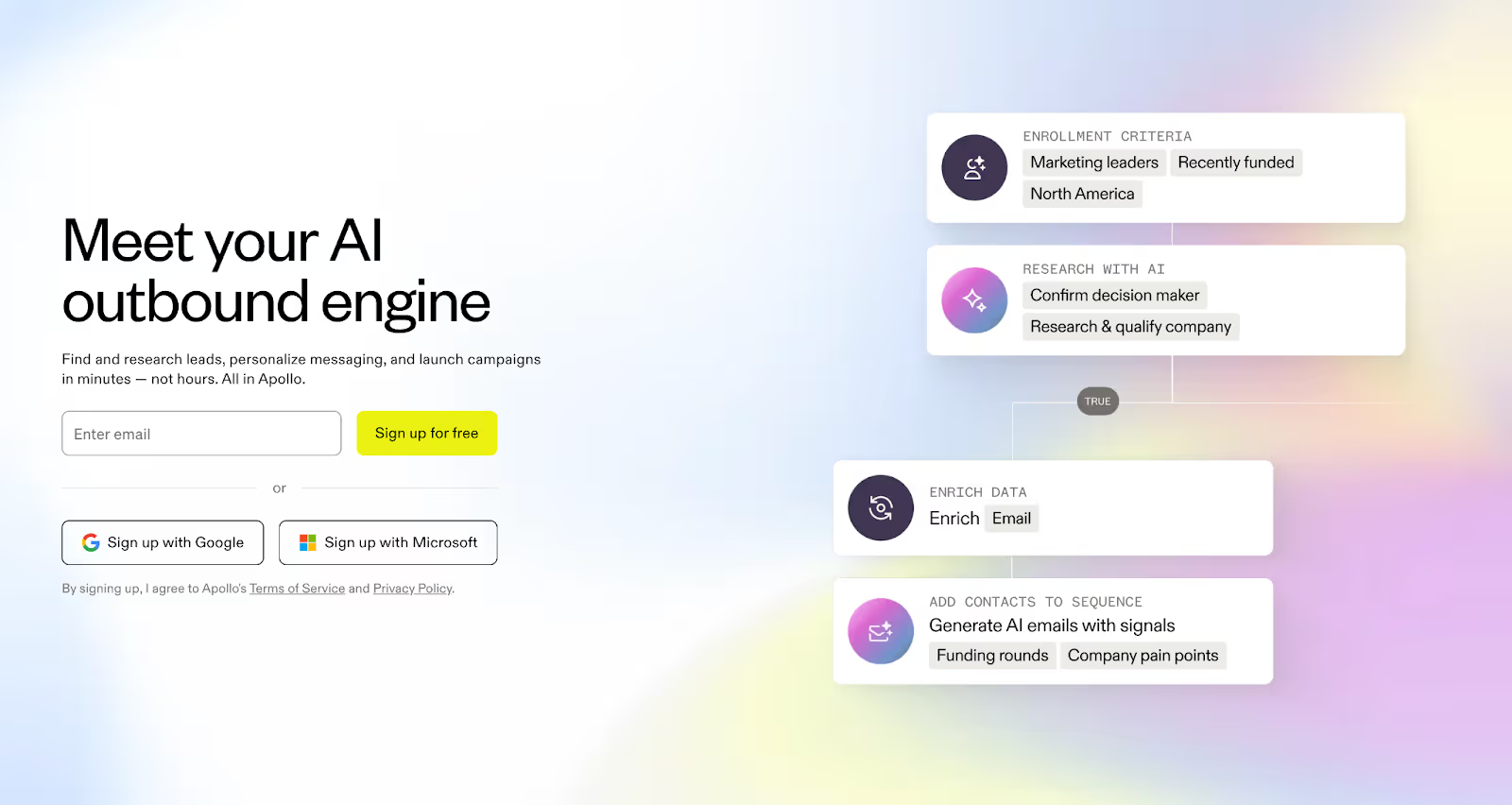
Core Offerings
- B2B Database: Access to 210M+ contacts and 35M+ companies, powered by Apollo’s Living Data Network.
- Pipeline Builder: AI-driven workflows to identify leads, build pipeline faster, and automate prospecting tasks.
- Call Assistant: Meeting scheduling, AI call insights, transcription, and automated follow-ups.
- Data Enrichment: Enrich CRM records with 30+ data points, ensuring freshness and accuracy across systems.
- Go-To-Market Platform: Unified hub for deal management, sales engagement, and CRM integrations.
- Integrations & Extensions: Native integrations with Salesforce, HubSpot, Outreach, and a Chrome extension for prospecting anywhere.
What it lacks
- Some customers report that Apollo has automatically migrated accounts to new plan variants without prior notice, altering contracted terms and creating uncertainty around pricing transparency. Source: G2
- Users mention that Salesforce (SFDC) integration is difficult to set up and maintain, with support often outsourced and unable to resolve tickets effectively. Source: G2
- Others note that Apollo’s intent data doesn’t always deliver reliable results, especially in metro markets. Source: G2
Pricing
Apollo keeps its pricing fairly straightforward. It offers a free trial and transparent tiers designed to scale as your prospecting needs grow. Here’s a quick look at what each plan includes and how they compare.
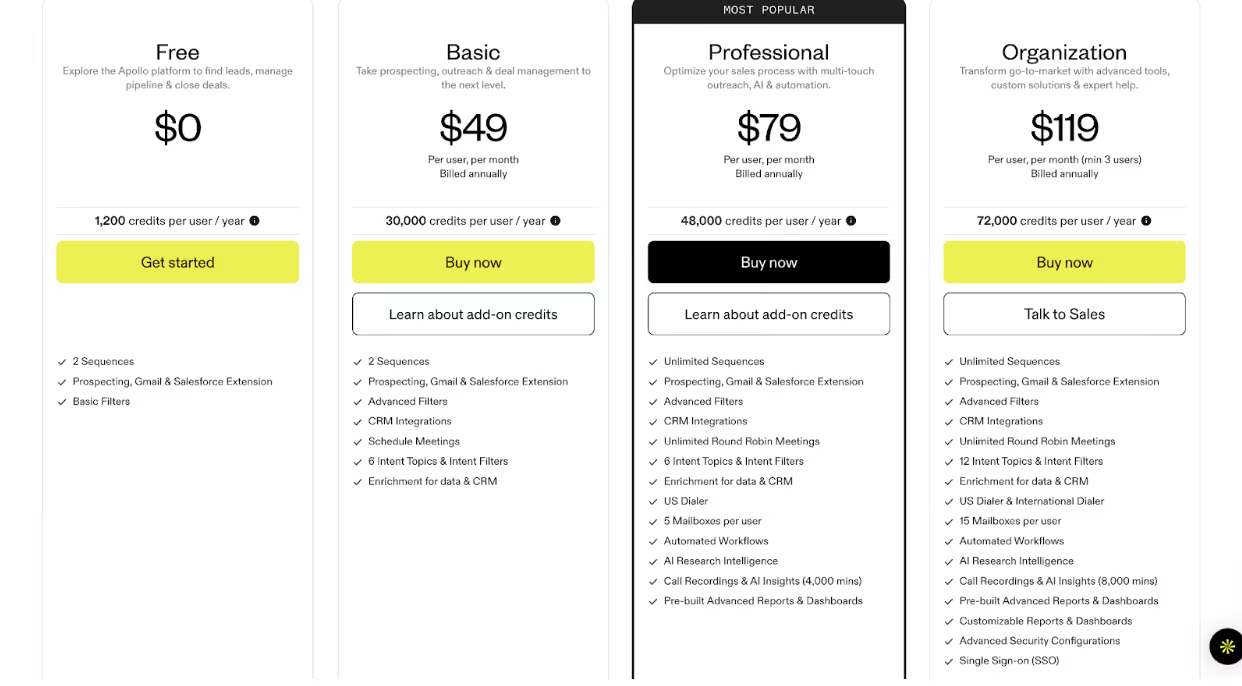
UpLead
UpLead positions itself as a lean, user-friendly prospecting platform built around real-time verified B2B contact data. Trusted by 4,000+ customers, it offers 95% data accuracy guarantees and aims to deliver reliable, cost-effective lead generation without unnecessary feature bloat.
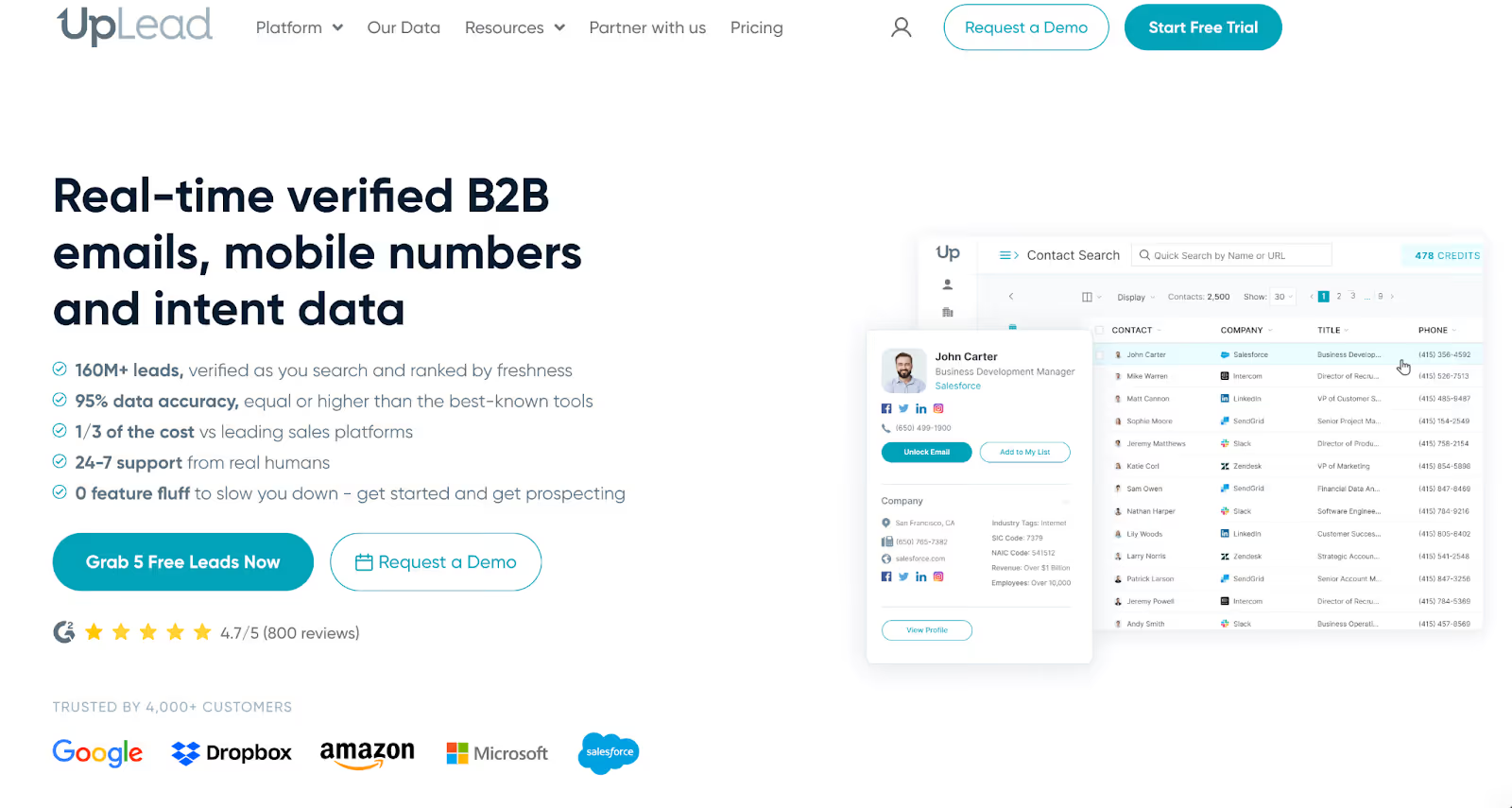
Core Offerings
- Real-time Verified Data: A 95% accuracy guarantee with instant email verification so sales teams avoid wasted outreach.
- Extensive Prospecting Filters: 50+ search filters to build laser-targeted lead lists tailored to your ICP.
- Mobile Numbers & Direct Dials: Access verified mobile and direct dial contacts to accelerate outreach.
- Intent Data: Identify and prioritize prospects actively researching solutions in your space.
- Technographics: Insights into 16K+ technology data points for sharper segmentation and targeting.
- Data Enrichment & Bulk Lookup: Sync thousands of records into your CRM with complete, updated data.
- Seamless Integrations: Connect directly with popular CRMs and outreach tools to streamline prospecting workflows.
What it lacks
While UpLead delivers strong accuracy guarantees, some users report issues with reliability and usability at scale:
- The database doesn’t always have full coverage for niche accounts or industries, leaving gaps in prospecting lists. source: G2
- Missing or inaccurate phone numbers have been flagged as a recurring frustration by sales teams. source: G2.
- Credits management can feel restrictive, with some users noting difficulty in accessing pre-purchased leads without keeping a paid plan active. Source: G2.
Pricing
UpLead keeps pricing simple and transparent, and you can start with a free trial to test the waters. From there, paid tiers scale with your prospecting needs. Here’s how the plans break down.
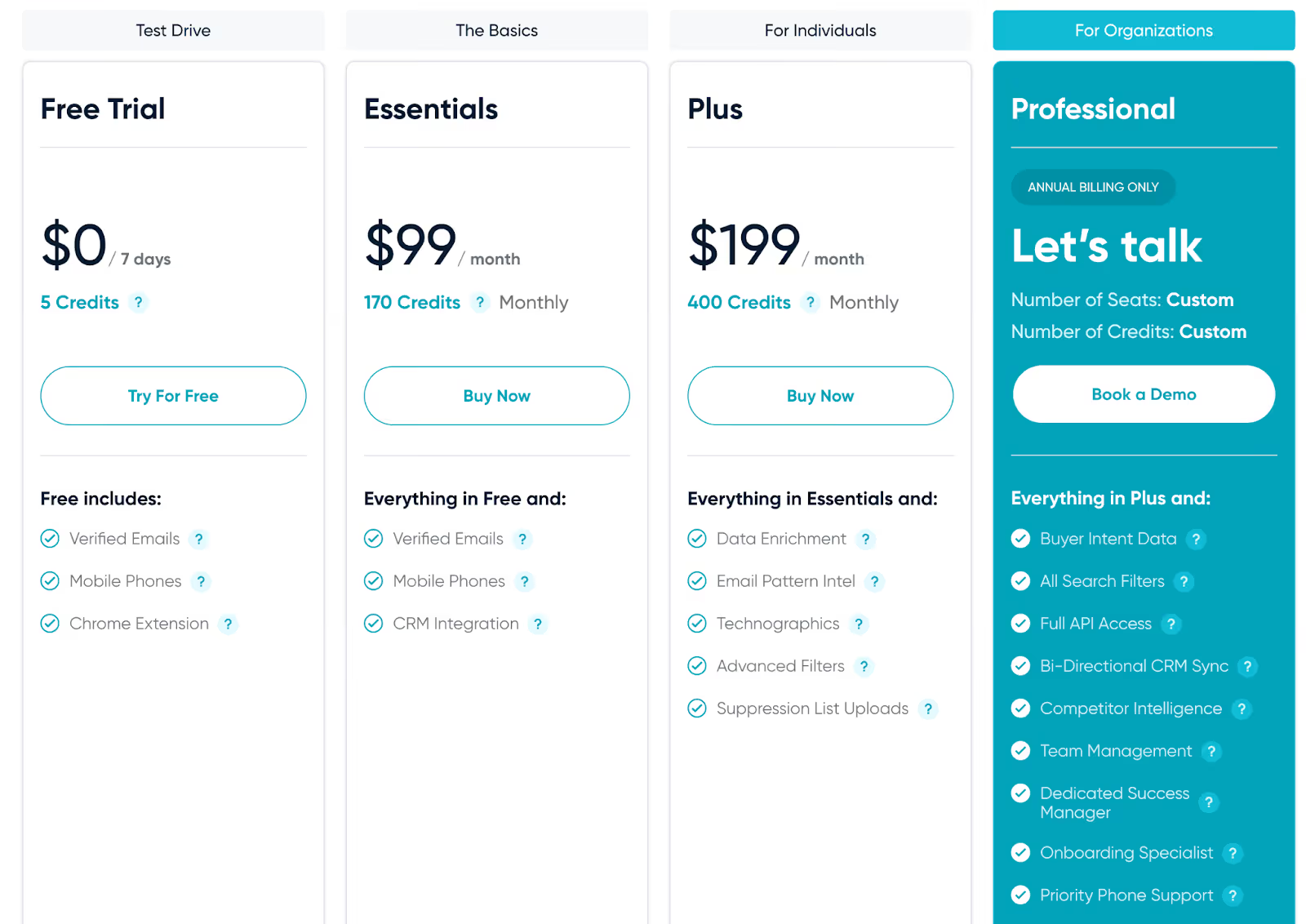
Lusha
Lusha markets itself as a sales intelligence platform designed to make prospecting faster with real-time verified contacts, buying signals, and GDPR/CCPA-certified compliance. With over 280M verified contacts and strong integrations, it appeals to sales, marketing, and recruiting teams that want a lighter, more affordable option than enterprise platforms.
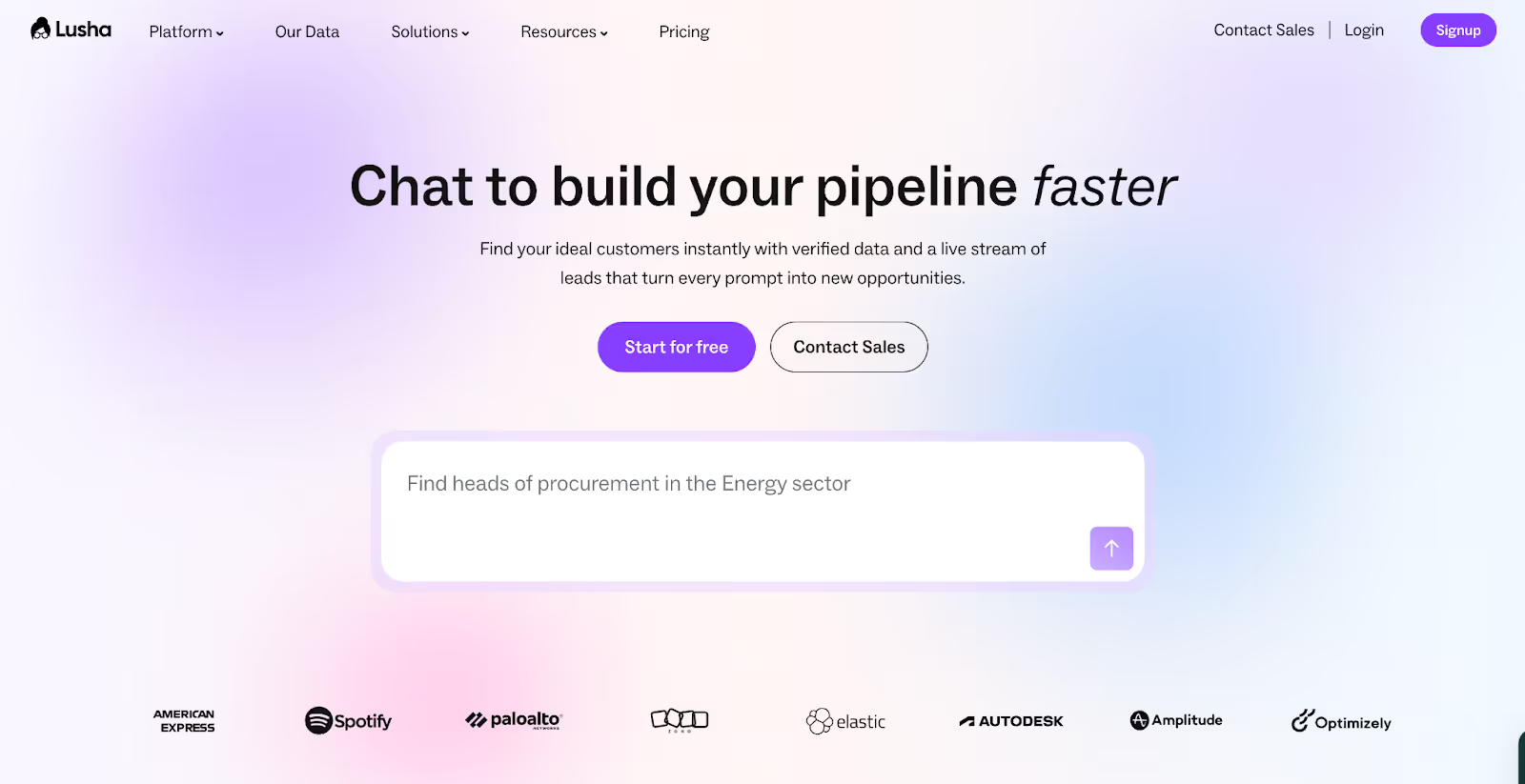
Core offerings
- Verified B2B Database: Access 280M+ decision-maker contacts with validated phone numbers and emails.
- High Data Accuracy: 85% phone accuracy and 98% email deliverability to reduce wasted outreach.
- Buyer Intelligence: Live intent signals help prioritize prospects who are actively looking to buy.
- Compliance & Security: GDPR, CCPA, ISO 27001, and SOC 2 Type II certifications provide data privacy confidence.
- Integrations & API: Enrich your CRM, sync prospect lists, and build workflows with Salesforce, HubSpot, Outreach, Slack, Zapier, and more.
- Chrome Extension: Find and capture verified contacts directly from LinkedIn and company websites.
What it lacks
Despite its strengths, user reviews suggest some recurring challenges:
- Cancellation and billing can feel restrictive, with customers noting difficulty in stopping auto-renewals or removing payment details. Source: G2
- Data coverage and quality don’t always match expectations, with reports of missing or inaccurate records. Source: G2
- Customer support and product reliability have been flagged as inconsistent, with some users citing bugs and slow resolution times. Source: G2
Pricing
Lusha’s pricing is built around a credit-based model, meaning you only pay for what you actually use. Each plan gives you a set number of credits that can be used to unlock verified contact and company data. You can start with a free plan to test the platform, then move up to paid tiers as your prospecting scales. Here’s a quick breakdown of how each plan works.
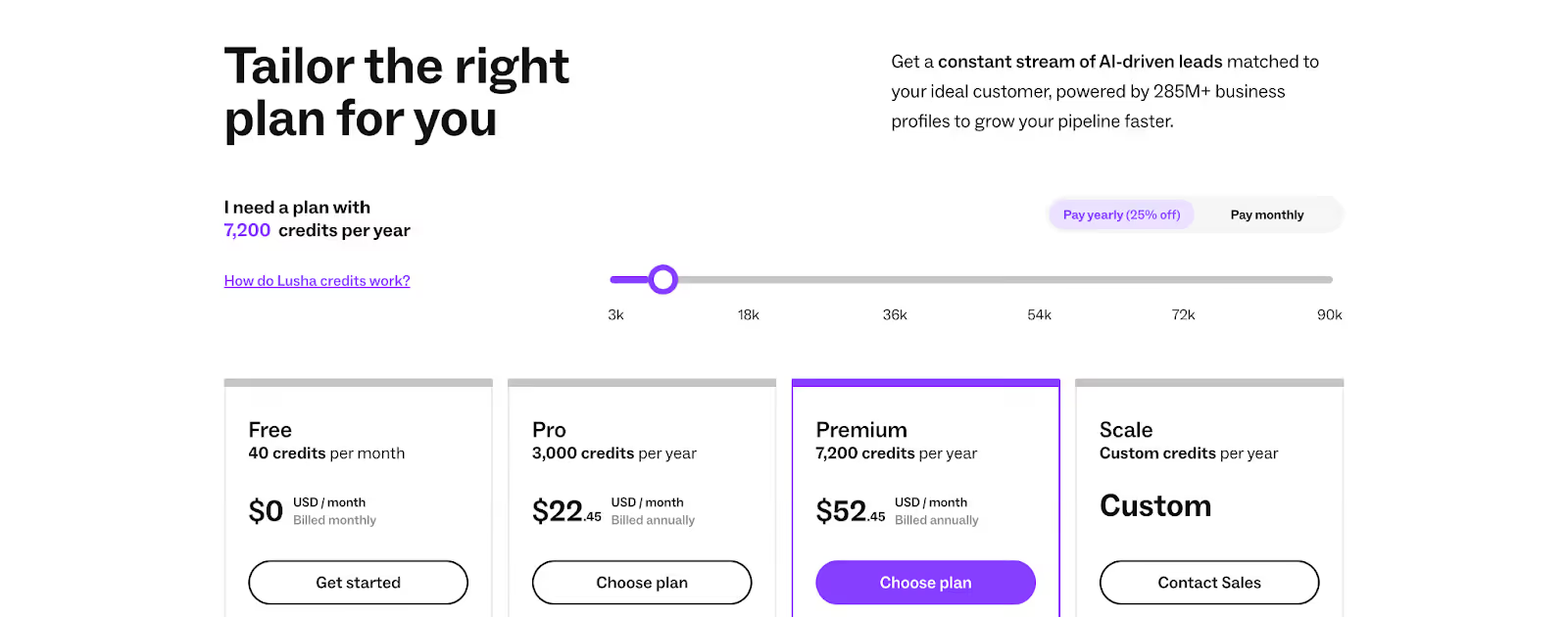
Seamless.AI
Seamless.AI positions itself as the #1 AI-powered real-time B2B contact data platform. It helps sales, marketing, and recruiting teams find verified contact info for over 1.3B+ contacts and 121M+ companies in seconds. With its Chrome extension and integrations with major CRMs like Salesforce, HubSpot, and Outreach, Seamless.AI promises to make prospecting faster, easier, and more accurate.
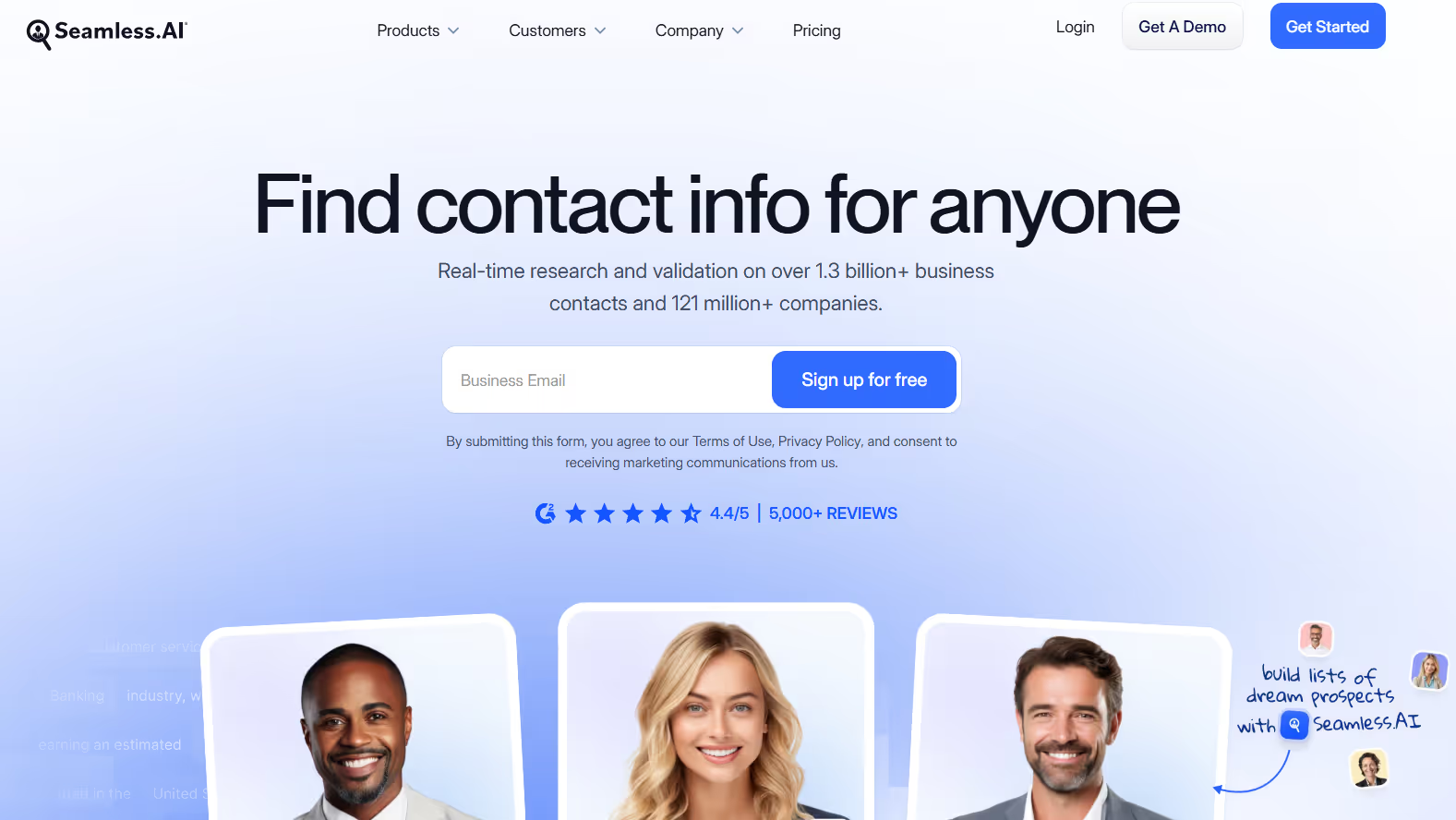
Core offerings
- Real-Time Prospecting: Access 1.3B+ contact records and 121M+ company profiles with verified email addresses and phone numbers.
- AI-Powered Research: Automatically research, validate, and enrich contact details for higher accuracy.
- Buyer Intent Data: Identify prospects who are ready to buy and prioritize your outreach.
- Job Change Tracking: Get notified when key prospects change roles to re-engage or upsell.
- Data Enrichment & CRM Sync: Enrich your CRM records and eliminate data decay with one-click integrations.
- Chrome Extension: Find emails and phone numbers directly from LinkedIn or websites.
What it lacks
- Aggressive Auto-Renewal & Billing Complaints: Multiple users reported being charged thousands of dollars for renewals without receiving prior notification, with no refunds issued despite legal requirements. Source: G2
- Data Accuracy Issues: Users frequently encounter outdated or inaccurate contact data (bounced emails, disconnected numbers), reducing the usable match rate to as low as 25%. Source: G2
- Persistent Sales Outreach & Rigid Contracts: Some reviewers noted excessive follow-ups from the sales team and contracts that are hard to exit without months of prior notice. Source: G2
Pricing
Seamless.AI does not list exact pricing publicly; plans are customized based on team size, desired features, and add-ons, and businesses need to contact sales for a personalized quote.
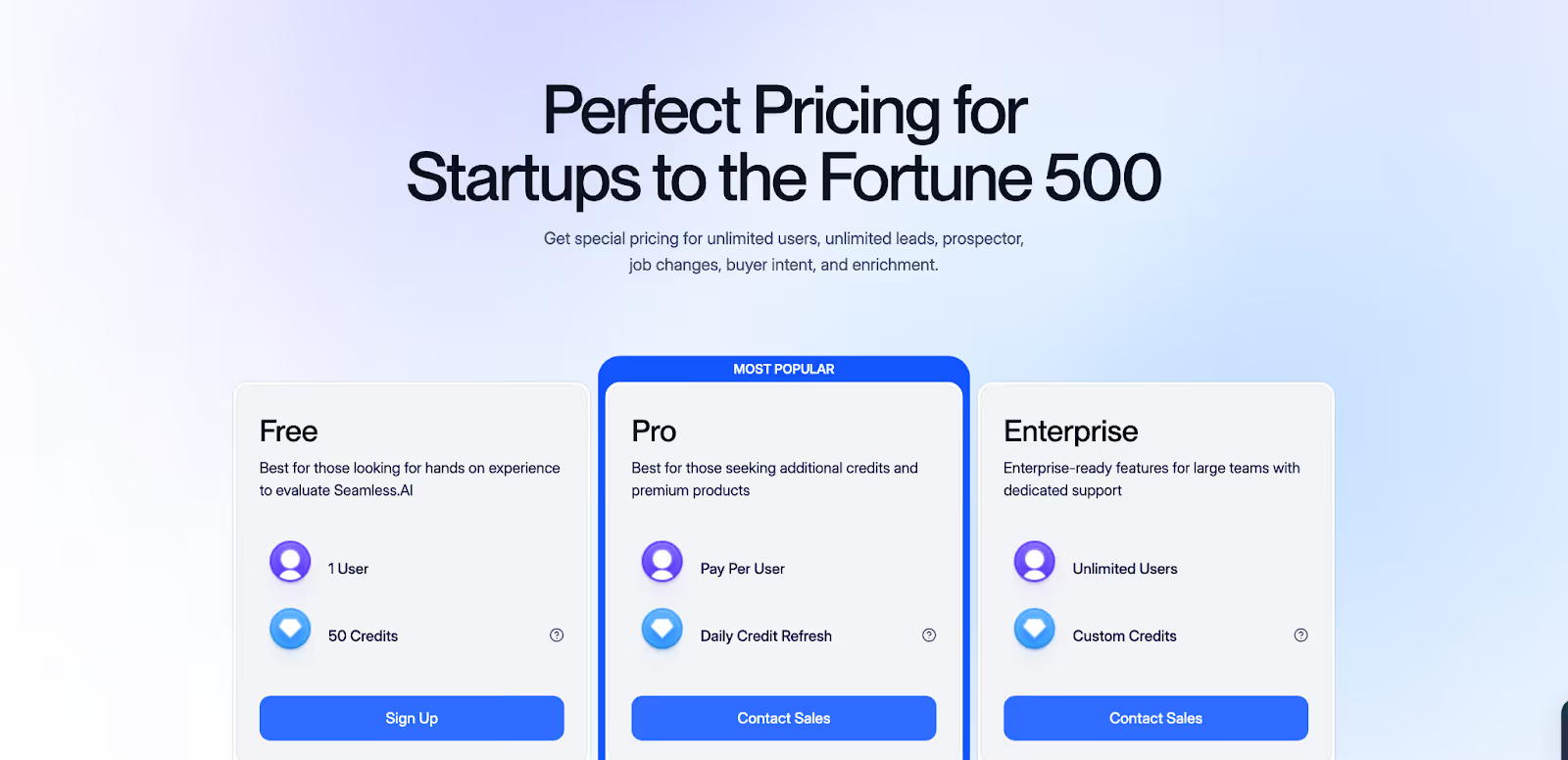
Hunter.io
Hunter.io is a popular email outreach and lead-generation platform trusted by 6M+ users worldwide. It helps businesses find, verify, and connect with the right prospects by providing accurate, GDPR-compliant contact data, all in one simple dashboard.
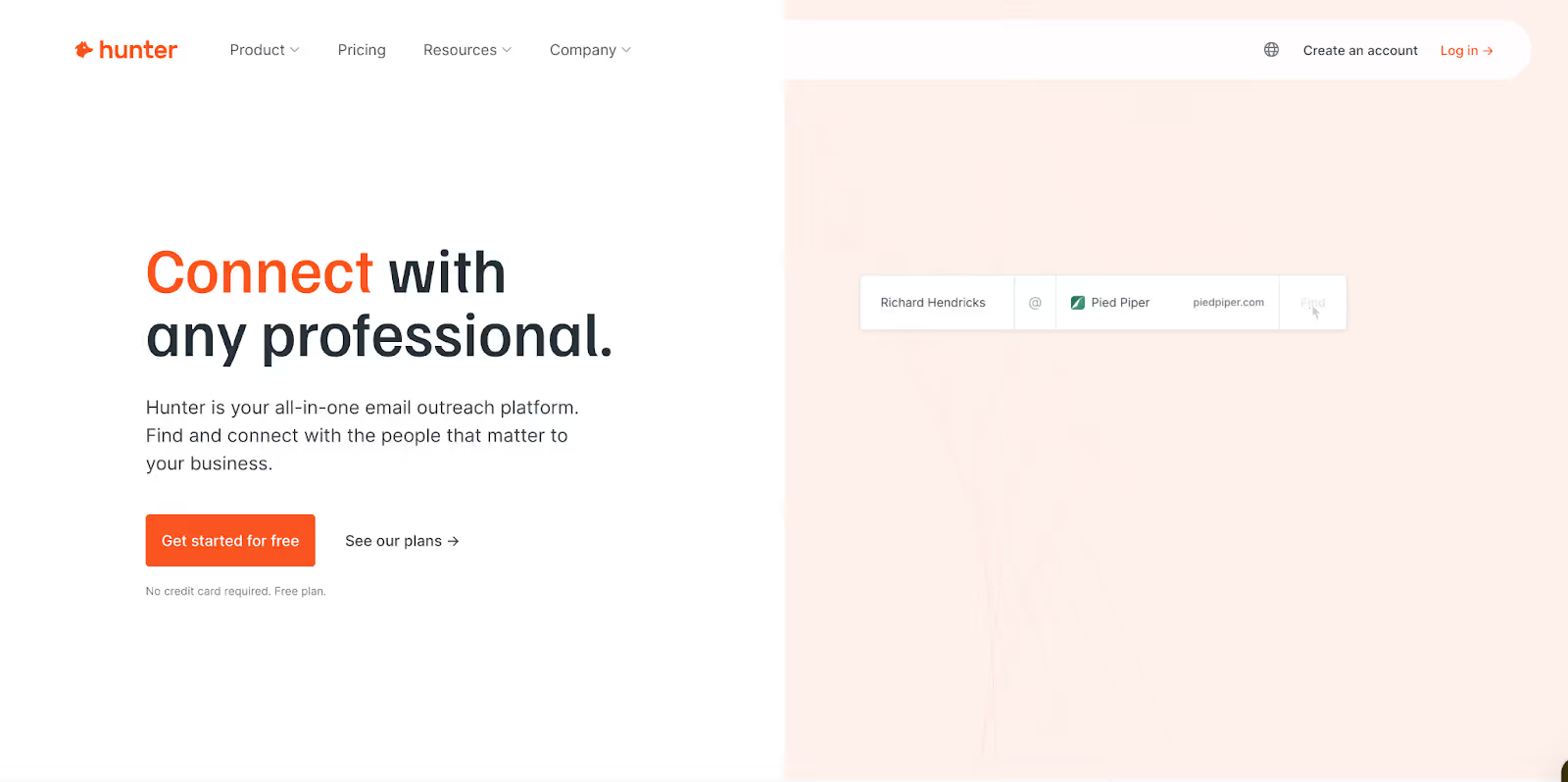
Core offerings
- Domain Search: Find verified email addresses associated with any company name or website.
- Email Finder: Type a name and instantly get a validated email address with a high match rate.
- Email Verifier: Eliminate bounces and protect sender reputation with reliable verification.
- Campaigns: Build, personalize, and schedule cold email campaigns with automated follow-ups.
- Integrations & API: Connect with Google Sheets, CRMs, Zapier, or use their API for large-scale data needs.
- Browser Extensions: Find emails directly from websites you visit.
What it lacks
- Some users report reduced data availability after recent updates, making it harder to justify the cost. Source: G2
- Email verification is expensive compared to competitors, with limited credits for the price. Source: G2
- Certain websites block Hunter’s crawler, resulting in errors or missed data even when correct. Source: G2
Pricing
Hunter.io keeps things simple with transparent, credit-based pricing, and even offers a free plan so you can test it out before committing. Each plan gives you a set number of searches and verifications, scaling up as your outreach grows. Here’s how the pricing breaks down.
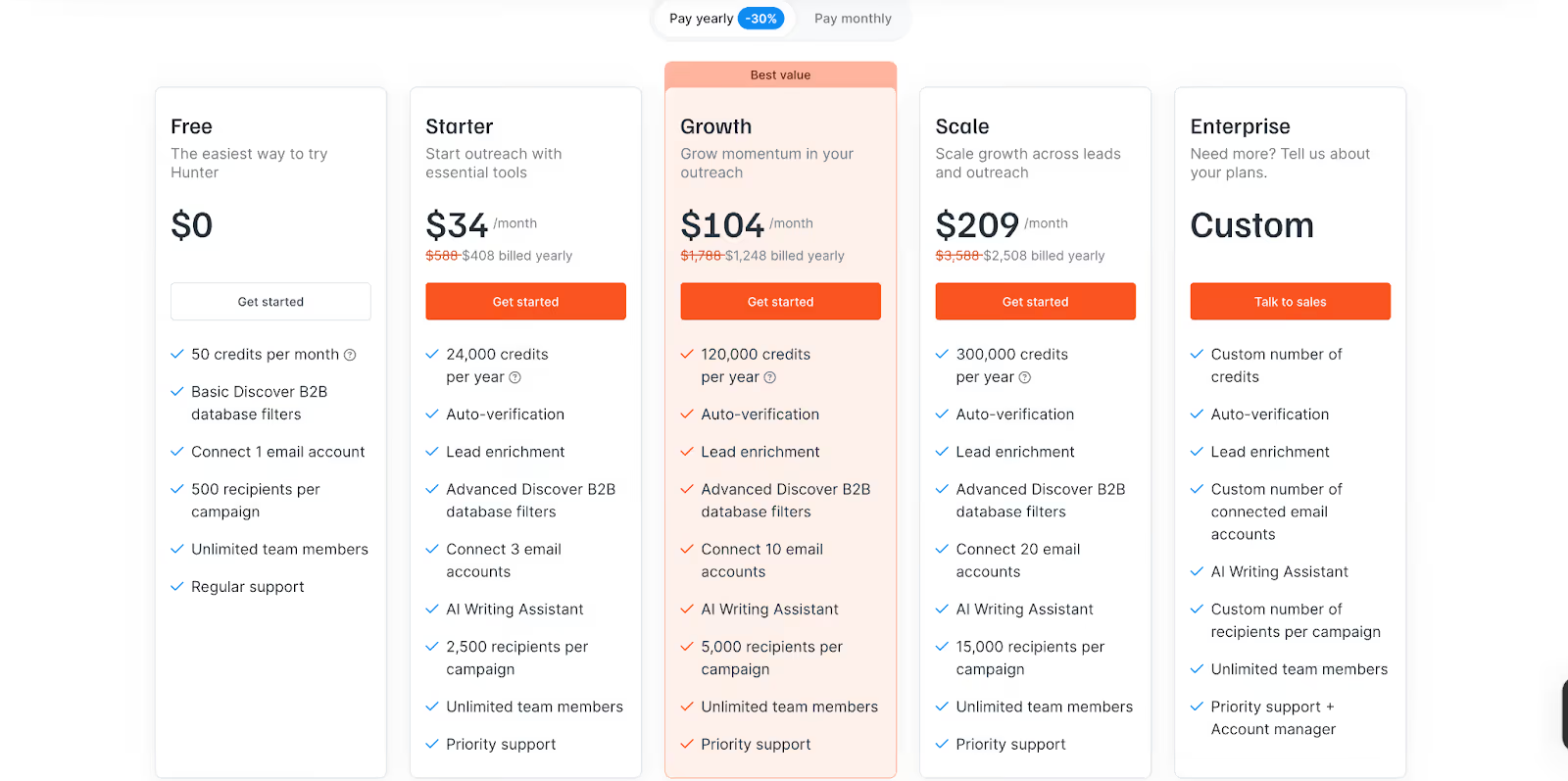
PS: The limitations we’ve shared are based on a limited number of user reviews and personal experiences. They don’t tell the full story of these tools. In fact, many users on G2 and other platforms have praised them for their reliability and value. We encourage you to explore those reviews too. Our goal here is to provide you with a balanced view, helping you make a more informed decision.
Looking for a better alternative to ZoomInfo? Here’s why many teams choose Factors.ai instead
While ZoomInfo and its alternatives excel at data accuracy and prospecting, today’s GTM teams need more than just contact databases. They need to know who’s ready to buy, when they’re ready, and what’s actually driving pipeline. That’s where Factors.ai vs ZoomInfo becomes an important comparison, helping revenue teams see how Factors.ai goes beyond static intent data to deliver actionable GTM intelligence.
Factors.ai in action:
- GTM Intelligence: AI agents that surface deep account research, revive closed-lost opportunities, and notify your reps the moment buyers show intent.
- Milestones & Account 360: Complete funnel visibility with unified reporting on every marketing and sales touchpoint.
- AI Alerts & Ad Syncs: Real-time triggers and seamless Google/LinkedIn ad syncs to engage the right audience at the right time.
- Account 360: A unified, sortable view of every sales and marketing touchpoint for an account — from ads and content engagement to sales outreach. Aligns GTM teams, improves targeting, and ensures no high-intent account slips through the cracks.
- LinkedIn AdPilot: 2X your LinkedIn Ads ROI with Factors' LinkedIn AdPilot. Sync high-intent audiences, controlling ad impressions, automating campaigns, and measuring true ROI with view-through attribution.
- Google AdPilot: Run better ads on Google with Google AdPilot. Google CAPI sends richer, more accurate conversion signals to Google Ads by combining click-level data, firmographics, and engagement scoring. Helps Google optimize for high-value accounts instead of low-quality leads. Google's Audience Sync enables advanced audience targeting for Google Ads. Retarget only ICP-fit accounts, suppress wasted clicks from job seekers or competitors, expand into expensive keywords with control, run buyer-stage–specific campaigns, and keep audiences fresh with daily automated updates.
- Account & Contact Scoring: Prioritize outreach with scores based on ICP fit, funnel stage, and intent intensity, so sales focuses on accounts most likely to convert.
- Customer Journey Timelines: See exactly what actions a buyer has taken across your website, ads, product, and CRM — all in chronological order.
- AI-Driven Contact Insights: Agents that surface the right contacts within each account, generate personalized outreach insights, and monitor deal progress.
- Dynamic Ad Activation: Sync audiences to LinkedIn and Google Ads in real time for budget-efficient targeting, in-funnel retargeting, and precise ABM campaigns.
- Slack/MS Teams Alerts: Instant notifications for high-intent actions such as demo page visits, security document views, or pricing page revisits.
- Multi-threading & Buying Group Identification: Identify and engage multiple decision-makers in a target account to reduce deal risk and avoid single-threaded opportunities.
Want a closer look at how Factors.ai helps GTM teams drive predictable growth? Book a demo with us today to learn more.
Choose the right ZoomInfo alternative (leave the guesswork out of the door)
ZoomInfo remains one of the most powerful names in the sales intelligence space but it’s not a one-size-fits-all solution. Whether it’s cost, contract flexibility, or the need for more user-friendly workflows, there are plenty of reasons why revenue teams explore alternatives.
The good news? The market is full of capable competitors like Apollo.io, UpLead, Lusha, Seamless.AI, and Hunter.io each with its own strengths. The right choice depends on your priorities: budget, data accuracy, feature depth, or ease of integration.
And if you’re looking to go beyond just contact lists and truly understand buyer intent, campaign performance, and revenue impact, a platform like Factors.ai can help you tie everything together.
Your next step? Review your team’s GTM goals, compare the options we’ve listed, and pick the platform that fits your business needs not just today, but for the long run.
FAQs on ZoomInfo Alternatives and Competitors
Q. Is ZoomInfo the only sales intelligence platform for enterprise teams?
A. No, while ZoomInfo is widely recognized, there are multiple competitors that serve enterprises effectively. Tools like Cognism and Apollo.io now offer enterprise-level data, compliance, and integrations at competitive prices.
Q. Do ZoomInfo alternatives provide compliance with GDPR or CCPA?
A. Yes, many ZoomInfo alternatives emphasize compliance with international data regulations. This makes them attractive for global businesses that need legally sound, privacy-first prospecting solutions.
Q. Can smaller startups benefit more from ZoomInfo alternatives?
A. Absolutely. Many ZoomInfo alternatives offer flexible pricing, smaller data packages, and easier onboarding.
Q. How do ZoomInfo alternatives handle integrations with CRMs and sales tools?
A. Most leading competitors provide direct integrations with Salesforce, HubSpot, and outreach tools. Some, like Apollo.io, even include built-in engagement features, reducing the need for additional software in the stack.
Q. Are ZoomInfo alternatives reliable for global prospecting?
A. Yes, but coverage varies. Some platforms focus on broad international databases, while others excel in specific regions. It’s best to match the provider’s strengths with your target markets.
Q. ZoomInfo-WebSights: has anyone had success using it?
A. Users say it’s helpful for seeing which companies visited, but frustrating when you need person-level IDs; workflows and page filters help, but it’s still company-level.
Q. What’s the difference between ZoomInfo WebSights and other website visitor tools?
A. WebSights maps visits to company profiles via IP and can push data to GA/ads; other tools claim person-level resolution, evaluate legality and match rates.
Q. Any luck with ZoomInfo’s intent data?
A. Mixed: some report real-time topics and better accuracy than other tools; others cite noise, test against your ICP.
Q. Is ZoomInfo worth $14k–$30k+ a year?
A. Opinions vary; many call it pricey and recommend proving ROI first or considering alternatives if you don’t need massive contact coverage.
Q. Is ZoomInfo still the best for mobile numbers and data quality?
A. Many sellers say ZoomInfo leads on US mobile coverage; accuracy still varies by niche and region.
Q. How much does ZoomInfo actually cost?
A. Community threads consistently cite opaque pricing; ballparks often start around $15k+/year depending on seats/credits.
Q. Any real user takes on Factors.ai?
A. Entrepreneurs and marketers mention using Factors.ai to unmask site traffic and find warm leads, results vary by traffic quality.
Q. Best alternative if I want analytics/attribution vs a big database?
A. Threads comparing analytics platforms (e.g., Dreamdata vs Factors) suggest choosing based on journey analytics & attribution needs over raw contacts.
Q. Are big lead databases still working in 2025?
A. Some marketers argue reply rates are declining with giant databases and suggest pairing first-party signals + identity instead.
See how Factors can 2x your ROI
Boost your LinkedIn ROI in no time using data-driven insights
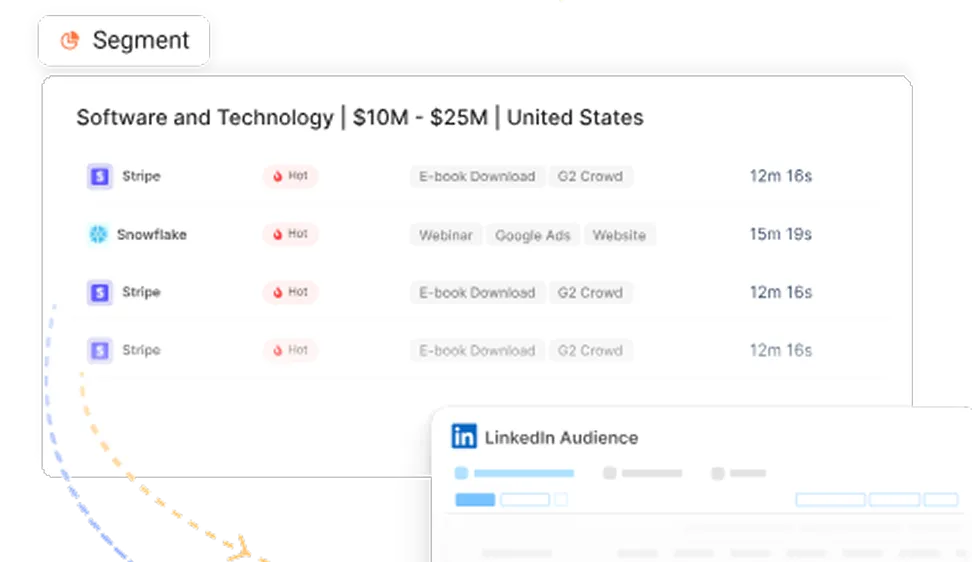
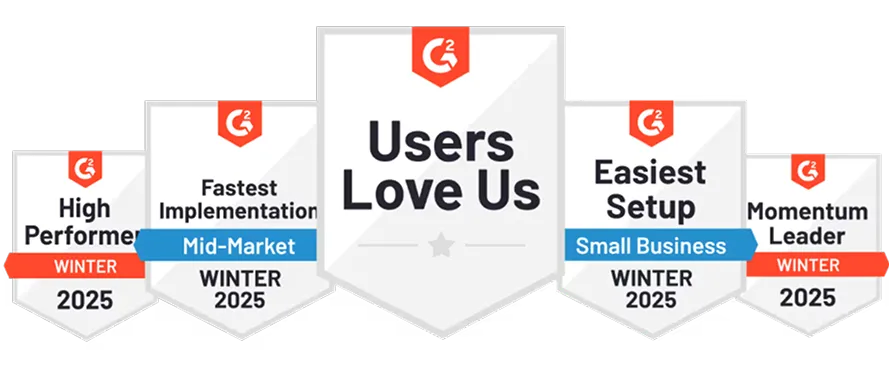
See Factors in action.
Schedule a personalized demo or sign up to get started for free
LinkedIn Marketing Partner
GDPR & SOC2 Type II
.svg)
.avif)

















